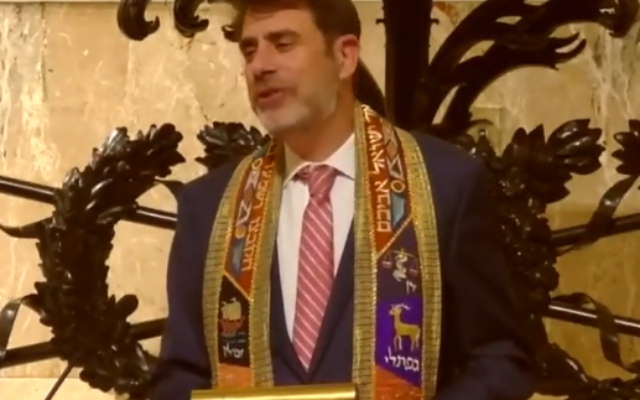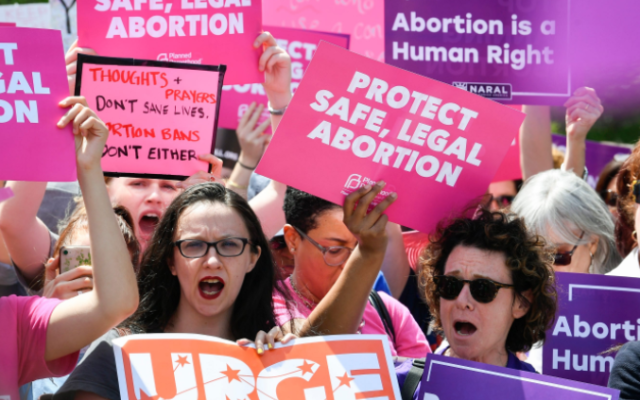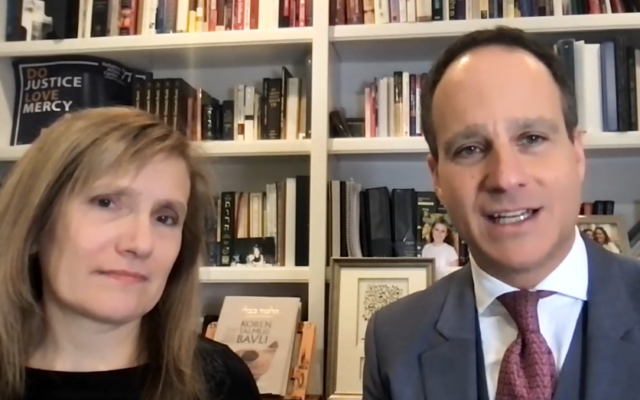The Temple Hosts Political Power Couple
Rabbi Jonah Pesner and his wife, Dana Gershon, spoke about reproductive rights at the congregation’s Scholar-in-Residence weekend.
One of Washington’s most politically influential couples, Rabbi Jonah Pesner and his wife, Dana Gershon, weighed in on the side of reproductive rights at The Temple’s Scholar-in-Residence weekend on January 28-29.
Pesner, who is executive director of the Union for Reform Judaism’s Religious Action Center in the nation’s capital, and his wife, who is president of the National Council of Jewish Women, positioned the battle over abortion rights as part of a broader campaign.
It is just one aspect, Pesner told the congregation during Friday night religious services, of a more serious attempt to restrict legal rights on a large number of social issues.
“There has been a rise of authoritarianism, of bigotry, of xenophobia and frankly, an assault on democracy in these last few years. And we, as Jews, experience it violently and we experience it personally. But we also witnessed, because we have intersectional identities, the ways in which many marginalized groups are experiencing this same rise and bigotry as authoritarianism.”
Gershon also tied the issue of abortion rights to the fight for social justice. She was particularly critical of attempts by Georgia’s legislature to restrict access to abortion clinics, adding that recent efforts have made the state the envy of all those who would make abortion illegal.

Gershon said that, according to the National Abortion Rights Action League, abortions are unavailable in 96% of Georgia counties, which represent some 58% of the state’s population.
“There is currently a bill pending in Georgia that would restrict access to medication abortion (the abortion pill),” she added, “and a law on the books that bans abortion as soon as a fetal heartbeat is detected. This law is tied up in court, but with Roe vs. Wade in imminent danger of being overturned or severely curtailed, it may only be a matter of time before most abortions in Georgia, like in Texas, are banned.”
Pesner and Gershon’s appearance was scheduled to coincide with Repro Shabbat, an event sponsored by 73Forward, an abortion rights coalition that was started last October by the National Council of Jewish Women. The coalition describes itself as “harnessing the energy and resources of Jewish women and allies” to seek “transformational change through education, advocacy and community-based service.”
According to 73Forward, nearly 600 abortion bans and restrictions have been introduced in U.S. state legislatures since 2011 in an effort to virtually eliminate access to abortion. In coordinating the program, The Temple joined several hundred other community-based events created by 73Forward.
The Friday evening service gave Pesner an opportunity to praise The Temple’s long history of commitment to social justice and close relationship with the Reverend Martin Luther King Jr. He noted that The Temple’s association with social justice, under the leadership of the late Rabbi Jacob Rothschild, goes back to the late 1940s.

“Let Rabbi Rothschild’s legacy remind us that he understood the core lesson. The lesson that I want to frame tonight, which is our safety as Jews, our safety as a minority, is in our solidarity and our redemption as a nation may yet come through our democracy, which is why Rabbi Rothschild and the luminaries of the Jewish community marched with Dr. King for voting rights and for civil rights — because our future, our democracy, our fate is bound up with one another.”
The Shabbat service took place just two weeks after the attack on the reform congregation in Colleyville, Texas. In remarks made on Twitter at the time, Pesner amplified his belief that such attacks should cause us not only to strengthen our solidarity with other Jews but also remind us of the need to build bridges with other faith communities.
“We must address the threats to our synagogues as both a distinct problem, yet at the same time a danger faced by every faith group. Sikh temples, African American churches, Muslim mosques and Protestant and Catholic churches have all been targeted. Government, law enforcement, civil society and the entire interfaith community must all be engaged in efforts to ensure Americans can pray safely and securely in their houses of worship.”
Peter Berg, The Temple’s senior rabbi, introduced Pesner as the Reform movement’s voice, hands and heart in Washington. Berg also happens to be an old friend of the couple. Their relationship goes back to when all three were national leaders in Reform Judaism’s youth movement.




comments